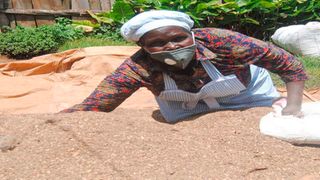
Lydia Wangui, a poultry farmer, harvests chicken manure, dries, sieves and packs in 50kg bag that she sells to dairy farmers who feed their animals for higher yields.
| John Njoroge | Nation Media GroupSeeds of Gold
Premium
Farmers cash in on alternative livestock feeds
What you need to know:
- Wangui was introduced to the business by a dairy farmer who came for the chicken droppings on her farm.
- The quantity and quality of chicken droppings produced depends on how the chickens are fed.
When she constructed poultry cages at her home in Mastima estate in Elburgon, Nakuru County, in 2015, Lydia Wangui was only interested in keeping chicken for eggs.
However, the chicken project has come with other benefits that she had not foreseen, chief among them sale of droppings to dairy farmers.
“I started the poultry project years after retiring as a school cateress in 2003. I began with 100 improved Kienyeji chickens before shifting to layers which produce more eggs,” says Wangui, who keeps 200 birds.
From the layers, she collects 180 eggs daily and sells a tray of 30 at Sh300 each in the town.
Her new source of income, however, are the chicken dropping that she collects from her 60 poultry cages.
“Once I collect, I spread on a polythene material for drying under the sun. I turn the dropping using a hoe for two to three days depending on the weather. I then sieve after ensuring they are odourless and pack in 50kg sacks for sale to dairy farmers at Sh800 each,” she says, noting she uses the rest of the trash that comprises of sawdust mixed with chicken dropping to grow vegetables in her kitchen garden.
Some farmers too buy it at Sh70 per 50kg bag for use as manure.
“The quantity of droppings depends on the number of chickens a farmer rears. I collect my waste every two weeks before processing it.”

Lydia Wangui collects chicken droppings from her farm.
Wangui was introduced to the business by a dairy farmer who came for the chicken droppings on her farm.
“I was surprised by his suggestion because I used to use the droppings only as manure or would give them away to my neighbours to avoid them becoming a nuisance on my farm,” she recalls.
She sold to the farmer 30 bags of sieved droppings and from that time, she has never looked back.
“Farmers come for the droppings to save on costs as the price of dairy meal has risen significantly. A 50kg bag goes for Sh2,000,” says Wangui, adding she earns at least Sh8,000 every two weeks from the droppings.
Wangui, a member of Elburgon, Molo, Turi Poultry Keepers Organisation, says she learnt from the group how to process the feeds for cows.
Dr David Cheruiyot of Etmo Farm, who feeds his 12 dairy cows the processed chicken droppings, said the feeds help boost milk production.
“The droppings comprise 10 percent of the feeds I offer my cows, the rest is total mixed ration. The thing is that the droppings have plenty of proteins,” says Cheruiyot, adding since he started using them as a supplementary feed, he now milks 18 litres from each of his cows daily, up from an average of 15.

Edmond Cheruiyot feeds his father’s dairy cows chicken manure mixed with dairy meal at Etmo Farm in Elburgon.
However, according to him, the trick is that one should mix the sieved droppings with salt and little dairy meal before feeding the cows to make them palatable.
“Apart from dairy cows, the chicken droppings are also good for fish.”
Nakuru county government poultry officer Eunice Nginya says chicken droppings are good for dairy cows because they contain Ms Eunice Nginya, the chicken droppings contain protein, calcium, phosphorus and energy that help boost the milk production, but they must be processed with care.
“The droppings must be dried well to ensure they have little moisture and to avoid ammonia poisoning of the livestock. They must then be sieved.”
She observes that processing of the droppings must be handled well from the onset.
“Medicine administered to poultry or when cleaning chicken pens should not find their way into the feeds. All this should be taken care of,” says Nginya.
The quantity and quality of chicken droppings produced depends on how the chickens are fed.
According to her, the chicken litter can cover almost entirely the protein and mineral requirements of cattle, particularly for beef animals.





